Jeep Compass vs Tesla Model 3 – Which car suits you better?
Both models have their strengths – but which one suits you more?
Compare performance, efficiency, price and space directly: Jeep Compass or Tesla Model 3?
Costs and Efficiency:
Price and efficiency are key factors when choosing a car – and this is often where the real differences emerge.
Jeep Compass has a minimal advantage in terms of price – it starts at 34200 £, while the Tesla Model 3 costs 34300 £. That’s a price difference of around 77 £.
In terms of energy consumption, the advantage goes to the Tesla Model 3: with 13.20 kWh per 100 km, it’s evident more efficient than the Jeep Compass with 17.50 kWh. That’s a difference of about 4.30 kWh.
As for range, the Tesla Model 3 performs evident better – achieving up to 702 km, about 202 km more than the Jeep Compass.
Engine and Performance:
Power, torque and acceleration say a lot about how a car feels on the road. This is where you see which model delivers more driving dynamics.
When it comes to engine power, the Tesla Model 3 has a decisively edge – offering 460 HP compared to 240 HP. That’s roughly 220 HP more horsepower.
In acceleration from 0 to 100 km/h, the Tesla Model 3 is clearly quicker – completing the sprint in 3.10 s, while the Jeep Compass takes 7.30 s. That’s about 4.20 s faster.
In terms of top speed, the Tesla Model 3 performs distinct better – reaching 262 km/h, while the Jeep Compass tops out at 200 km/h. The difference is around 62 km/h.
There’s also a difference in torque: Tesla Model 3 pulls convincingly stronger with 660 Nm compared to 345 Nm. That’s about 315 Nm difference.
Space and Everyday Use:
Whether family car or daily driver – which one offers more room, flexibility and comfort?
Both vehicles offer seating for 5 people.
In curb weight, Jeep Compass is somewhat lighter – 1575 kg compared to 1822 kg. The difference is around 247 kg.
In terms of boot space, the Tesla Model 3 offers slight more room – 594 L compared to 550 L. That’s a difference of about 44 L.
When it comes to payload, Jeep Compass distinct takes the win – 470 kg compared to 333 kg. That’s a difference of about 137 kg.
Who comes out on top?
Overall, the Tesla Model 3 shows itself to be dominates this comparison and secures the title of DriveDuel Champion.
It convinces with the more balanced overall package and proves to be the more versatile choice for everyday use.
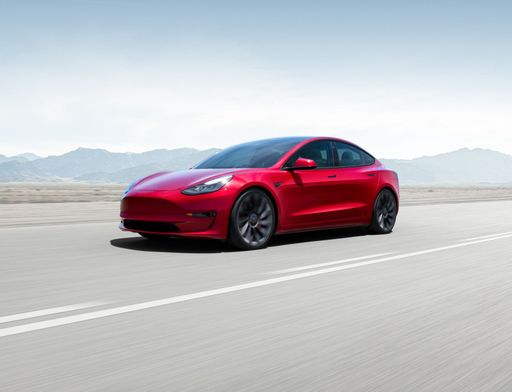
Tesla Model 3
Jeep Compass
The Jeep Compass combines a rugged aesthetic with modern sophistication, making it a standout choice in the compact SUV segment. Its robust design is complemented by a comfortable interior that offers ample space and cutting-edge technology for a seamless driving experience. Whether tackling urban environments or venturing off-road, the Compass provides versatility and reliability, embodying the adventurous spirit synonymous with the Jeep brand.
details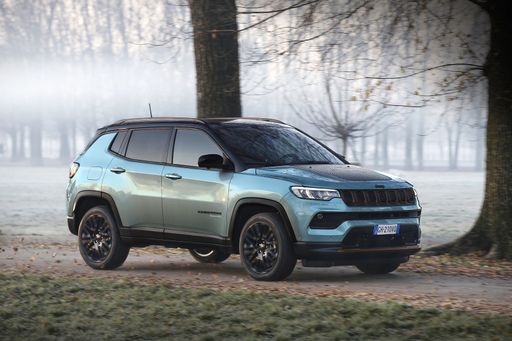 @ media.stellantis.com
@ media.stellantis.com
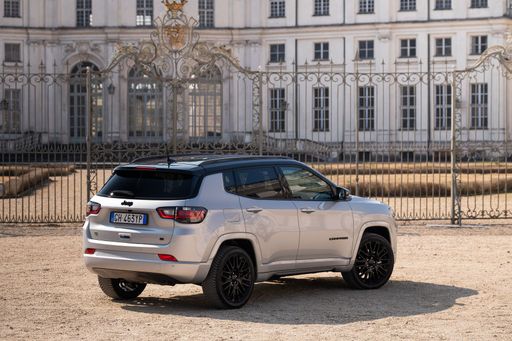 @ media.stellantis.com
@ media.stellantis.com
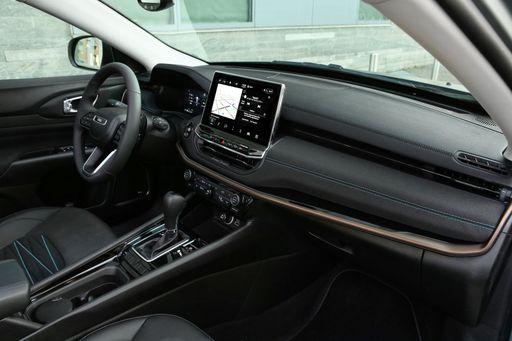 @ media.stellantis.com
@ media.stellantis.com
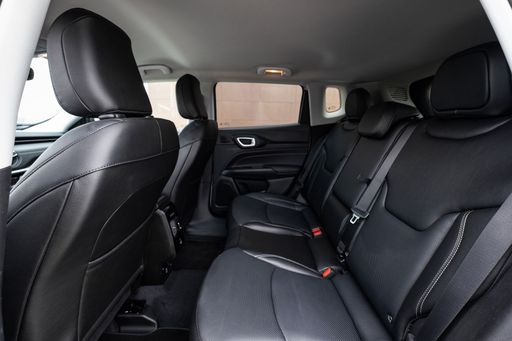 @ media.stellantis.com
@ media.stellantis.com
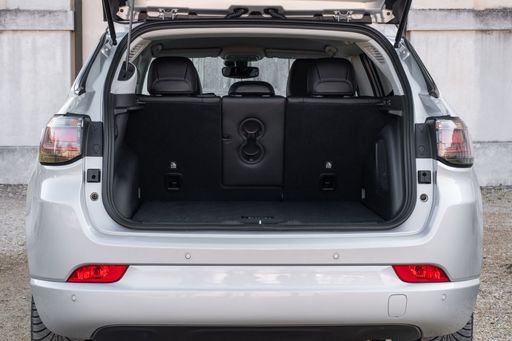 @ media.stellantis.com
@ media.stellantis.com
Tesla Model 3
The Tesla Model 3 stands out in the electric vehicle market with its sleek design and impressive performance capabilities. It offers a seamless driving experience that combines advanced technology with minimalistic interiors, creating a futuristic feel on the road. Additionally, its range and charging infrastructure make it a practical choice for both city commuting and longer journeys.
details @ tesla.com
@ tesla.com
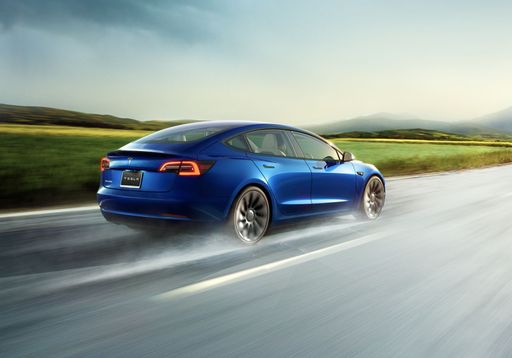 @ tesla.com
@ tesla.com
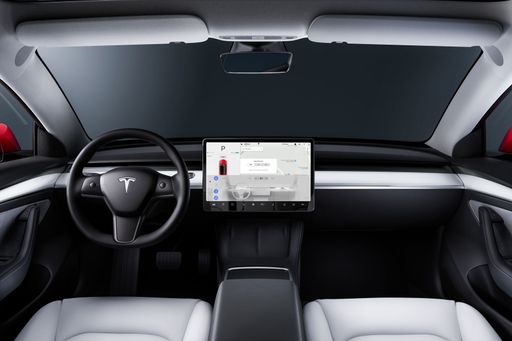 @ tesla.com
@ tesla.com
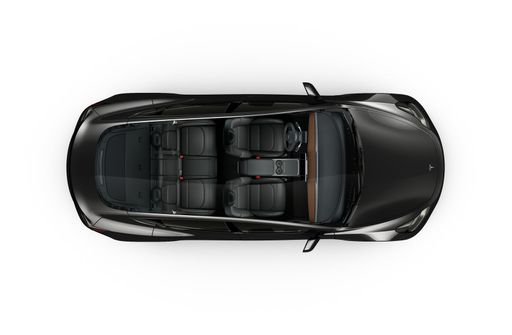 @ tesla.com
@ tesla.com

|

|
|
|
|
Costs and Consumption |
|
|---|---|
|
Price
34200 - 46900 £
|
Price
34300 - 50100 £
|
|
Consumption L/100km
2 - 5.9 L
|
Consumption L/100km
-
|
|
Consumption kWh/100km
17.50 kWh
|
Consumption kWh/100km
13.2 - 16.7 kWh
|
|
Electric Range
36 - 500 km
|
Electric Range
513 - 702 km
|
|
Battery Capacity
74 kWh
|
Battery Capacity
64.5 - 79 kWh
|
|
co2
0 - 133 g/km
|
co2
0 g/km
|
|
Fuel tank capacity
36 - 55 L
|
Fuel tank capacity
-
|
Dimensions and Body |
|
|---|---|
|
Body Type
SUV
|
Body Type
Sedan, Hatchback
|
|
Seats
5
|
Seats
5
|
|
Doors
5
|
Doors
4 - 5
|
|
Curb weight
1575 - 2198 kg
|
Curb weight
1822 - 1929 kg
|
|
Trunk capacity
420 - 550 L
|
Trunk capacity
594 L
|
|
Length
4404 - 4552 mm
|
Length
4720 - 4724 mm
|
|
Width
1819 mm
|
Width
1850 mm
|
|
Height
1629 - 1675 mm
|
Height
1431 - 1440 mm
|
|
Max trunk capacity
1230 - 1387 L
|
Max trunk capacity
-
|
|
Payload
465 - 470 kg
|
Payload
303 - 333 kg
|
Engine and Performance |
|
|---|---|
|
Engine Type
Petrol MHEV, Plugin Hybrid, Electric
|
Engine Type
Electric
|
|
Transmission
Automatic
|
Transmission
Automatic
|
|
Transmission Detail
Dual-Clutch Automatic, Automatic Gearbox, Reduction Gearbox
|
Transmission Detail
Reduction Gearbox
|
|
Drive Type
Front-Wheel Drive, All-Wheel Drive
|
Drive Type
Rear-Wheel Drive, All-Wheel Drive
|
|
Power HP
130 - 240 HP
|
Power HP
283 - 460 HP
|
|
Acceleration 0-100km/h
7.3 - 10.3 s
|
Acceleration 0-100km/h
3.1 - 6.1 s
|
|
Max Speed
180 - 200 km/h
|
Max Speed
201 - 262 km/h
|
|
Torque
230 - 345 Nm
|
Torque
420 - 660 Nm
|
|
Number of Cylinders
4
|
Number of Cylinders
-
|
|
Power kW
96 - 177 kW
|
Power kW
208 - 338 kW
|
|
Engine capacity
1199 - 1469 cm3
|
Engine capacity
-
|
General |
|
|---|---|
|
Model Year
2024 - 2025
|
Model Year
2023 - 2024
|
|
CO2 Efficiency Class
D, B, A
|
CO2 Efficiency Class
A
|
|
Brand
Jeep
|
Brand
Tesla
|
What drivetrain options does the Jeep Compass have?
The Jeep Compass is available as Front-Wheel Drive or All-Wheel Drive.
The prices and data displayed are estimates based on German list prices and may vary by country. This information is not legally binding.
